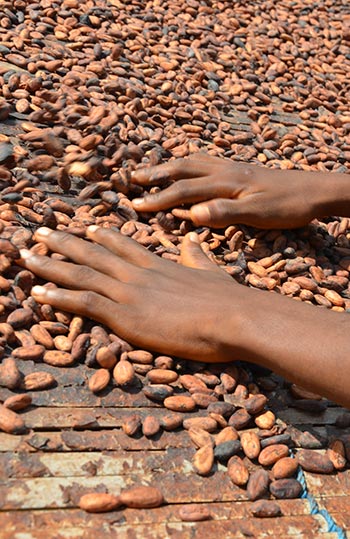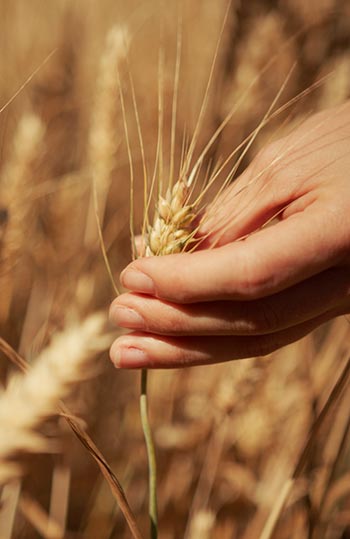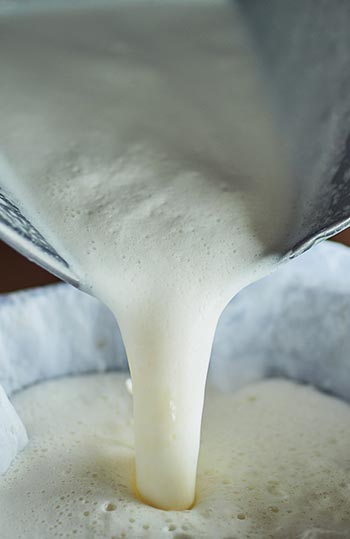We are using cookies in order to facilitate your navigation. By continuing to navigate on this website or clicking on the close button you accept our policy regarding the usage of cookies.
Yes, I accept Learn moreNASDAQ: MDLZ $56.82 USD -0.16 (-0.28%)
Sustainable Ingredients
Our business depends on a steady, high-quality supply of agricultural crops like cocoa, wheat and many other commodities to create our delicious snacks. Smallholder farming communities in particular need support to increase their resilience. That is why we are using our company's reach and global presence to work together with outside experts to give farmers a voice.
| Goal | Progress | Highlight |
|---|---|---|
|
All chocolate brands will source their cocoa through Cocoa Life by 2025 |
On Target |
63% of our cocoa volume for our chocolate brands sourced via Cocoa Life, the foundation of our long-term strategy, reached 175,000 farmers in more than 2,000 communities |
|
Source 100% of our EU wheat need via Harmony by 2022 |
On Target |
At the end of 2019, 80% of our biscuits in Western Europe, and 65% across Europe, were made with Harmony flour. |
|
Maintain 100% RSPO palm oil |
Goal Achieved |
Maintained 100% RSPO palm oil goal while pushing for more reforms |
|
100% palm oil traceable to the mill from suppliers with aligned policies |
On Target |
Almost all of the palm oil we sourced was traceable back to mill (maintained 97%+) and 98% was from suppliers with aligned policies |
|
100% cage-free eggs in U.S. and Canada by 2020 and rest of the world by 2025* |
On Target |
17% of our global eggs sourced were cage-free |
* With the exception of Russia and Ukraine
Agricultural Supply Chain
Our global food system is facing numerous challenges that are weighing down on individual farmers and the land they use. These challenges are complex and call for solutions that require coordinated efforts by governments, industry and scientific, social and environmental experts. Smallholder farming communities in particular need support to increase their resilience. We’re working to build a thriving ingredient supply chain to ensure sustainable supplies of high-quality cocoa, wheat and other raw materials to create our delicious snacks—chocolate brands like Milka, Cadbury and Côte d’Or; or Oreo and LU biscuits. We are using our reach and global presence to work together with outside experts to give farmers a voice. Our signature programs, Cocoa Life and Harmony Wheat, aim to make a positive impact on the farms, communities and environments where our main raw materials are grown. We are also addressing key areas where we can have the most impact, requiring more transparency, and collaborating with our key suppliers and others to promote widespread change so that sustainability becomes the normal way to do business in key raw materials




Cocoa Life
At Mondelēz International, we are passionate about chocolate. Cocoa is the essence of our chocolate and vital to our business, so we ensure it is “made right.” Making it right means tackling the complex challenges that cocoa farmers face. That is why we created Cocoa Life. Just as the Cadbury brothers did more than 100 years ago, we work on the ground, hand-in-hand with the men and women who make their living from cocoa across six cocoa-growing countries: Ghana, Côte d'Ivoire, Indonesia, Dominican Republic, India and Brazil. Through Cocoa Life, we are creating a movement for lasting change, rooted in deep understanding through sector-wide collaboration and partnership. We co-create solutions to make cocoa farming a business of choice and to build communities that take on their own development while conserving the natural resources. Together, we grow opportunities. When our consumers choose chocolate with the Cocoa Life logo, it means everyone can love our chocolate as much as we do— because it’s made the right way protecting the planet and respecting the human rights of people in our value chain.
Our Interactive Cocoa Farm Map shows Cocoa Life’s worldwide scale. It also visualizes the individual farmers and their communities that are participating in Cocoa Life. We also disclose the tier 1 and tier 2 suppliers, for more information click here.
Harmony Wheat
As the world’s largest biscuit producer, we’re on a mission to make sure the wheat we use is grown with the environment in mind. Working with farmers, local organizations and governments, we are changing the way wheat is grown by improving local conditions and farming systems. Harmony Wheat works with over 1,600 wheat farmers, 13 millers and 26 cooperatives, and has seen a 20% reduction in pesticide use. Currently, 80% of our Western European biscuits are made with Harmony Wheat. By 2022, we will create 100% of our biscuits across Europe with this program.
Sustainable Palm Oil Sourcing
We’re committed to sourcing palm oil sustainably to preserve natural habitats, stop deforestation, protect human rights and reduce climate change. We’re proud of our strong progress and from Q1 2021, we expect 80 percent of our palm oil to meet enhanced traceability and forest-monitored expectations. Working to increase coverage as quickly as possible, we continue to pioneer partnership and action with our suppliers to ensure they share and actively support not only our commitment, but the larger collective commitment to realize a forest positive future where palm oil is sustainably sourced across the sector. Click here to read more about our sustainable efforts with our palm oil supply chain.
Dairy Collaboration
Milk and other dairy products are important ingredients for our cheese and chocolate products. Since 2013, sustainability projects all over the world are coordinated by the Dairy Sustainability Framework (DSF), the dairy sector’s program to align, connect and demonstrate continuous improvement in sustainability. In Europe, we built our sustainability agenda by working with key suppliers and national initiatives on a principle of continuous improvement. In Germany, we supported the development of a new voluntary Quality Milk Standard and implemented it in 2016. And across Europe, we are engaging all of our milk suppliers to build their sustainability roadmaps. We track progress according to the proportion of our dairy ingredients sourced from recognized industry standards. Currently, 62 percent of our total global dairy supply is sourced from suppliers following recognized standards, meeting our aim to achieve majority by 2020.

